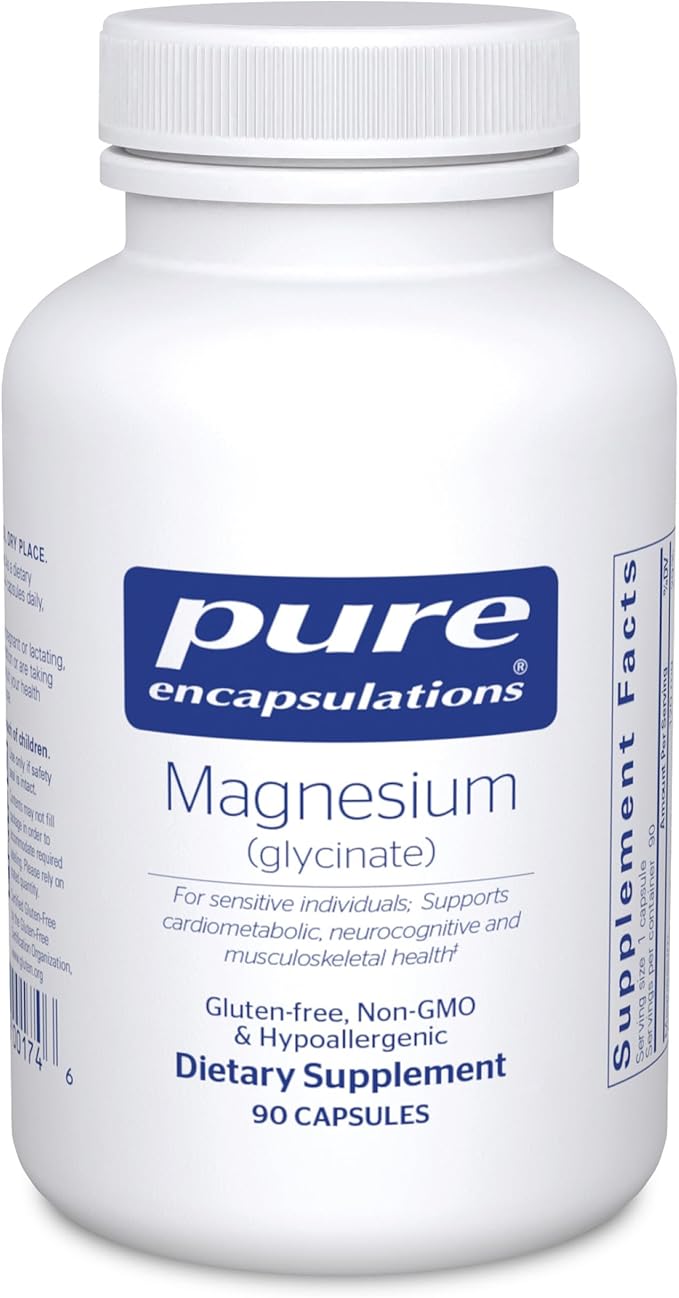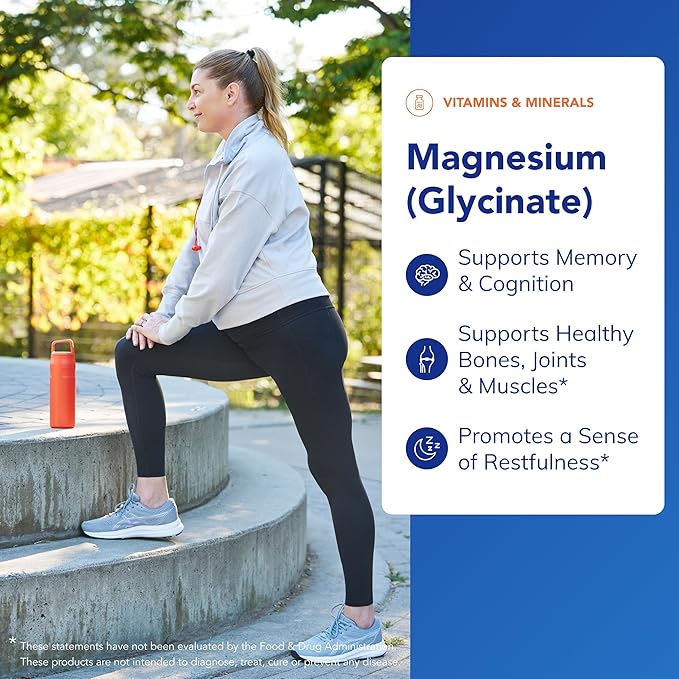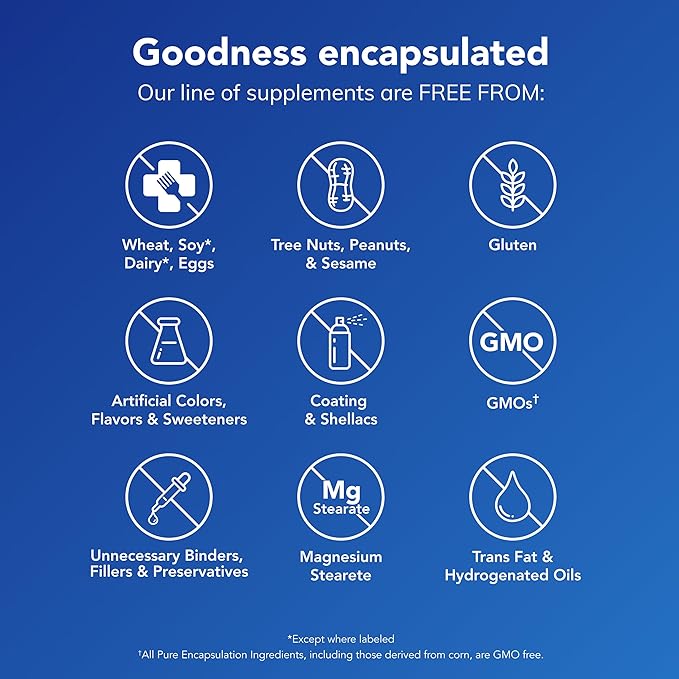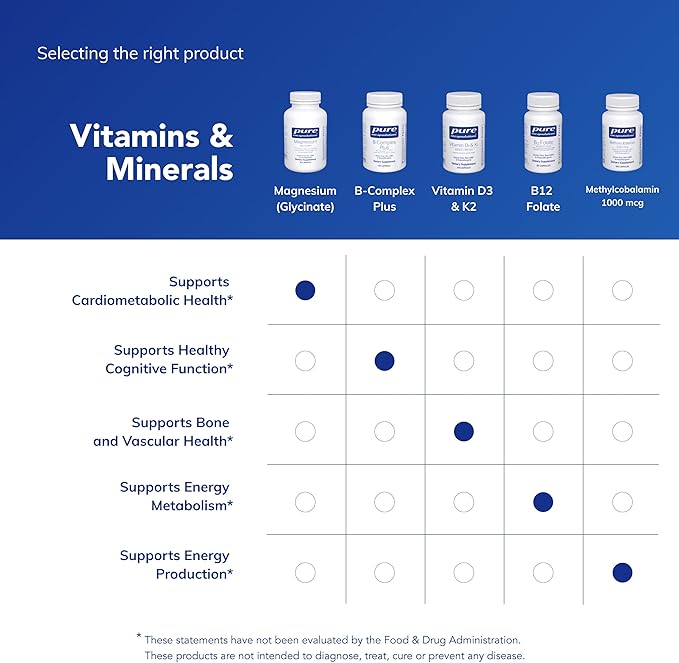My Store
Pure Encapsulations Magnesium (Glycinate) 90ct
Pure Encapsulations Magnesium (Glycinate) 90ct
Couldn't load pickup availability
Supplement to Support Stress Relief, Sleep, Heart Health, Nerves, Muscles, and Metabolism
- Heart Health Supplements: This magnesium glycinate capsule activates the enzymes necessary for neuromuscular contractions, cardiac function, and more*
- Energy & Bone Support: Magnesium supports metabolism of carbs and amino acids; supports energy production and use of calcium, phosphorus, sodium, and potassium*
- Overall Health & Nutrient Metabolism: This magnesium glycinate supplement helps the metabolism and utilization of vitamin B6, vitamin C, vitamin E, and more*
- Sleep & Relaxation Aid: Magnesium glycinate may help to support the sleep cycle and aid a sense of relaxation by increasing total dietary magnesium intake daily*
Ingredients
Each serving size (1 vegetarian capsule) contains: Magnesium (as magnesium glycinate) 120 mg. Other ingredients: Vegetarian capsule (cellulose, water), ascorbyl palmitate.
Directions
As a dietary supplement, take 1-4 capsules daily. Consume with food.
Verifiable Science
Magnesium activates the enzymes necessary for a number of physiological functions, including neuromuscular contractions, cardiac function, and the regulation of the acid-alkaline balance in the body.1-4 In a cross-sectional study involving 210 elderly individuals, optimal magnesium intake was associated with positive mood, lipid metabolism and lean body mass.5 Magnesium is necessary for the metabolism of carbohydrates, amino acids and fats, as well as energy production and the utilization of calcium, phosphorus, sodium and potassium.6-12 In a 15-year study involving almost 5,000 young adults, higher intakes of magnesium were associated with healthy cardiovascular function and glucose utilization.13 Another large cross-sectional study found that magnesium intake was positively associated with bone mineral density in certain subgroups.14 This vital mineral also helps utilize some vitamins, including vitamin B6, vitamin C and vitamin E.15,16 Magnesium (glycinate) is less likely to cause loose stools than other forms of magnesium.17‡
References
- Orchard TS, et al. Am J Clin Nutr. 2014 Apr; 99(4): 926-933.
- Dahle LO, et al. Am J Obstet Gynecol. 1995 Jul;173(1):175-80.
- Fuentes JC, et al. Congest Heart Fail. 2006 Jan-Feb;12(1):9- 13.
- Minich DM, et al. Altern Ther Health Med 2007 Jul-Aug;13(4):62-5.
- Barragin-Rodriguez L, et al.Magnes Res. 2008 Dec;21(4):218-23.
- Rodriguez-Morin M, et al. Diabetes Care. 2003 Apr;26(4):1147-52.
- Brilla LR, et al. J Am Coll Nutr. 1992 Jun;11(3):326-9.
- Galland L , et al. Magnesium. 1985;4(5-6):333-8.
- Heaton RW.. Clin. Sci. 27: 31, 1964.
- Hiroshi M, et al. Jpn J Nutr Diet. . 2005. 63(1); 27-31.
- Dirup I, et al. J Intern Med. 1993 Feb;233(2):117- 23.
- Hamill-Ruth RJ, et al. Crit Care Med. 1996 Jan;24(1):38-45.
- He K, et al. Circulation. 2006 Apr 4;113(13):1675-82.
- Ryder KM, et al. J Am Geriatr Soc. 2005 Nov;53(11):1875-80.
- Lee SH, et al.Am J Hypertens. 2002 Aug;15(8):691-6.
- De Souza MC, et al. J of Women's Health & Gender-Based Medicine. March 2000, 9(2):131-139.
- Hans CP, et al. Indian J Exp Biol 2002 Nov;40(11):1275-9.
Share










